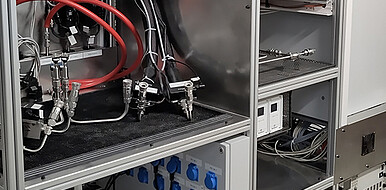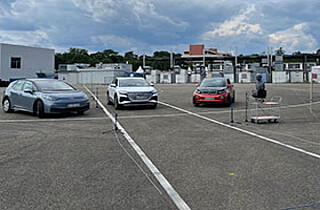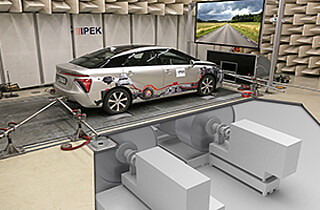Performance test for fuel cell systems

Mobile and stationary fuel cell systems and hydrogen are key components of the energy transition. As emission-free energy sources, they are used in mechanical engineering and in the energy industry. Fuel cell systems power vehicles, ships and aircraft and also supply large server systems with energy as an emergency power supply.
State of the art
In the product development of fuel cell systems today, only individual system components can be tested in isolation. Multiple test series with modified components are very time-consuming. This extends the overall development time. Testing an entire fuel cell system is therefore only possible at great expense. The dynamics of the individual components and their influence on the fuel cell have also not yet been able to be tested.
Technology
A new test bench for fuel cells and system components at the Institute for Product Development (IPEK) at KIT provides a remedy. The mobile test bench simulates the fuel cell, the hydrogen cycle, the air supply and the cooling system. The IPEK-X-in-the-loop approach links the data acquisition system with the simulation environment. This means that different application scenarios can be changed at the click of a mouse. All hardware components are easily interchangeable. The integrated sensors record measurement data from the system components and the electrical data from the fuel cell. The simulation system is used to model the drive with battery and electric motor. It continuously measures the performance of the fuel cells, the other components and the system under the set conditions (e.g. air compression and hydrogen recirculation). This allows the entire system operation to be evaluated. Depending on the system configuration, the efficiency, dynamics and service life of the fuel cells, for example, can be mapped and analyzed.
Advantages
By using the test bench, the development times and costs of fuel cell systems can be significantly reduced. Better and more detailed tests result in better products, which ultimately also increase the service life and efficiency for the end customer.
Options for companies
KIT makes the test bench available to interested companies to test their own components in complete system variants during product development. Direct contract research or joint research and development cooperations are also possible.



